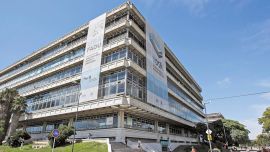The news is out there. It’s big enough, if only for a while, to placate the buzz about the coronavirus pandemic and Argentina's ongoing restructuring of more than US$65 billion in foreign debt.
President Alberto Fernández, the country’s centre-left Peronist leader, has announced the state takeover of the debt-saddled soy crusher Vicentin. A trustee has been named for 60 days, while a bill is sent to Congress to allow the outright nationalisation of the company to be approved. The president said that a leftist Kirchnerite senator, who was present at the Monday press conference, has been working on the nationalisation bill.
Vicentin, based in Santa Fe Province, owes US$1.2 billion to many banks, home and abroad, including Banco Nación. The agro giant filed for bankruptcy in February. The company was a major contributor to the campaign of former centre-right president Mauricio Macri, who lost the presidential elections last year to Fernández. Now the new administration has seated progressive economists on the board of Banco Nación. The soft loans are over. The takeover is in motion. The plan is to nationalise the company and include it in the agricultural arm of state-run oil giant YPF.
Vicentin last year accounted for 19 percent of soybean sales and 23 percent of all soybean oil shipments, according to Reuters. It all sounds straightforward enough. The company owes farmers money, company jobs are at risk. The government did not want Vicentin gobbled up by foreign buyers for a pittance.
The president's announcement was also straightforward enough – perhaps too straightforward. Fernández did not dive deep during the press conference to explain Vicentin’s financial ruin. Santa Fe Governor Omar Perotti, a centrist Peronist, voiced support for the new trustee in what was taken as a sign that this was not only a plan of the coalition’s left wing.
Done deal? Not so. The announcement unleashed almost immediate protests by Argentine flag-waving locals in Vicentin’s two neighbouring hometowns in northern Santa Fe. Emissaries of the government's trustees were kicked out of the local hotel and had to leave the place under police protection. Vicentin’s executives refused to accept the takeover. The local town mayor, a member of the opposition coalition, harped on about the family tradition of the company, which goes back 90 years. On Wednesday night in Buenos Aires City, the centre-right opposition’s home turf, pots and pans were banged loudly in most neighbourhoods against the sudden takeover.
The Wednesday night ruckus even included criticism from former caretaker president Eduardo Duhalde, a veteran Peronist once opposed to Kirchnerismo who technically backs the government. He said that he had sent Fernández a message telling him that he was sure the situation would be sorted out the next day, implying that the president should not go ahead with the nationalisation plan.
The situation has brought back memories of the 2008 stand-off between then-president Cristina Fernández de Kirchner (now vice-president) and the farmers over a plan to increase soybean export duties. That measure was eventually defeated in Congress after a long conflict which included roadblocks, lockouts and protests. Fernández, now president, was Cabinet chief in 2008 and he quit in disagreement with the all-out confrontation toward the end of the stand-off.
So what can we conclude? A raw nerve has been touched that is at the centre of Argentina's perpetual political rift – to the nation’s business community the Peronist administration has crossed a line, trying to grab a private-sector company which has never been under state control. To the progressive camp Vicentin is now a symbol of the decadence of the private sector – a soybean crusher so mismanaged that it now can't pay local farming co-ops for their produce. Take a brief look at the company books and too many executives are fraudsters hooked on securing soft loans from their cronies in office, critics charge.
The raw nerve has a memory. Past Kirchnerite administrations since 2003 have privatised YPF, the Correo Argentino post office, the AySA water company and airline Aerolíneas Argentinas. The move on Vicentín had the international news agencies firing off wires about the Peronist administration stirring up the giant soy market. In an ideal world, they say, with a soy crusher under its thumb, Argentina would directly receive the dollars it so desperately thirsts for.
Perotti, after delivering what looked to be his unconditional support for the move, has now tried to mediate between president and company. Fernández leads a complex ruling coalition and Perotti, who won back Santa Fe Province for the Peronists after years of Socialist-Radical rule, is not a member of the Kirchnerite wing of Frente de Todos. The speculation is that Perotti – who is now struggling with a crisis in his Cabinet over this – favours a takeover but not an all-out nationalisation.
The mediation by a centrist Peronist could upset the left wing of the ruling coalition, which is championing the nationalisation in Congress and calling it a bid by the nation to achieve “food sovereignty.” Reports said Lower House Speaker Sergio Massa, another prominent ruling coalition member who was once a Kirchnerite foe, is also in favour of seeking a compromise with the farm sector over the nationalisation.
The president has held telephone talks with Vicentin’s executives who want the bankruptcy process to still go through the courts. The nationalisation bill must be approved in Congress, where Frente de Todos is not fully in control of the Lower House. The coalition has failed to move anything through Congress quickly during the coronavirus pandemic lockdown – a wealth tax bill sponsored by Kirchnerite lawmakers has been backed in public by Fernández, but it has yet to be debated in Congress. Meanwhile, a group of opposition lawmakers have sued Fernández for “abuse of authority” in the Vicentin case – Juntos por el Cambio claims the bankruptcy case is already in the courts and that the judge handling it has more authority than the Executive to rule on company issues.
On Thursday evening, Fernández was scheduled to meet with Vicentin executives, but the nationalisation bill was still on the table and the trustees were already in control. The company, at Perotti's request, issued a statement accepting the takeover before scheduled talks with the president, in which both sides were set to explore “alternatives.” The government said talks with company officials were an indication that it is being reasonable and it is not trying to ram the nationalisation down the throat of the private firm.
The nationalisation story is massive, enough to have snatched attention away from the coronavirus and Argentina’s debt restructuring negotiations, the deadline for which has been extended repeatedly.
Nevertheless, the virus has not gone away, though some seem to be forgetting. Hundreds if not thousands of runners rushed out on Monday night to exercise all at once in the capital’s parks after the mayor eased restrictions of the local lockdown. The extraordinary sight of what to non-runners looked like a race to risk contagion prompted the president to telephone City Mayor Horacio Rodríguez Larreta to tell him that what he was seeing was “wrong.” Argentina is now reporting over 1,000 coronavirus cases a day, mainly concentrated in the capital and Greater Buenos Aires. Fernández has implied that the situation may be serious enough to go return to a total lockdown in affected areas.
The race is not yet run.






















Comments